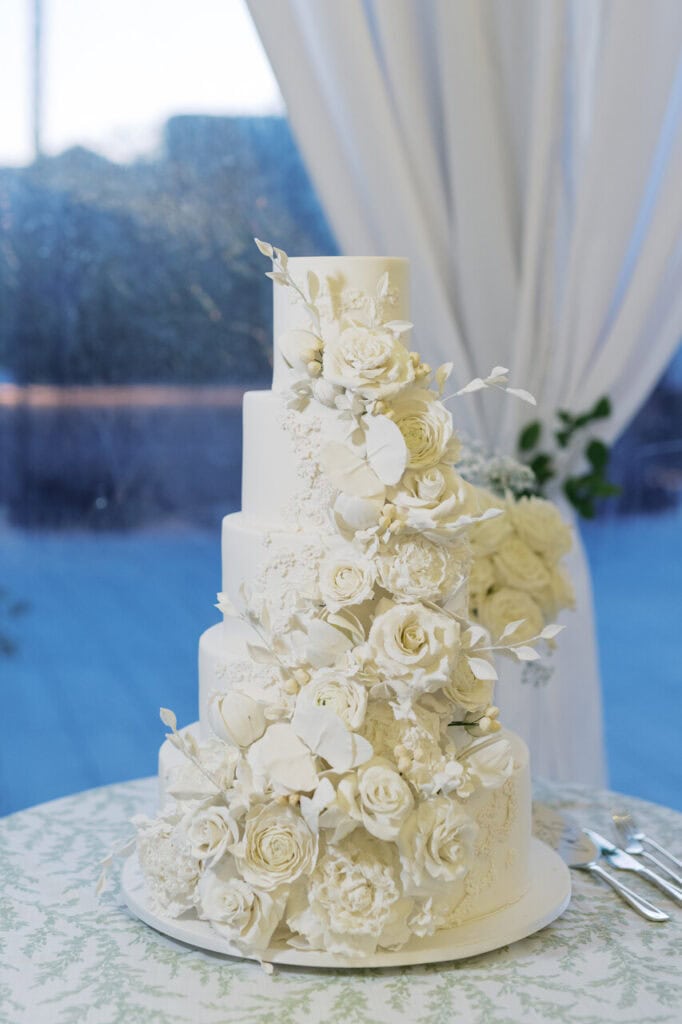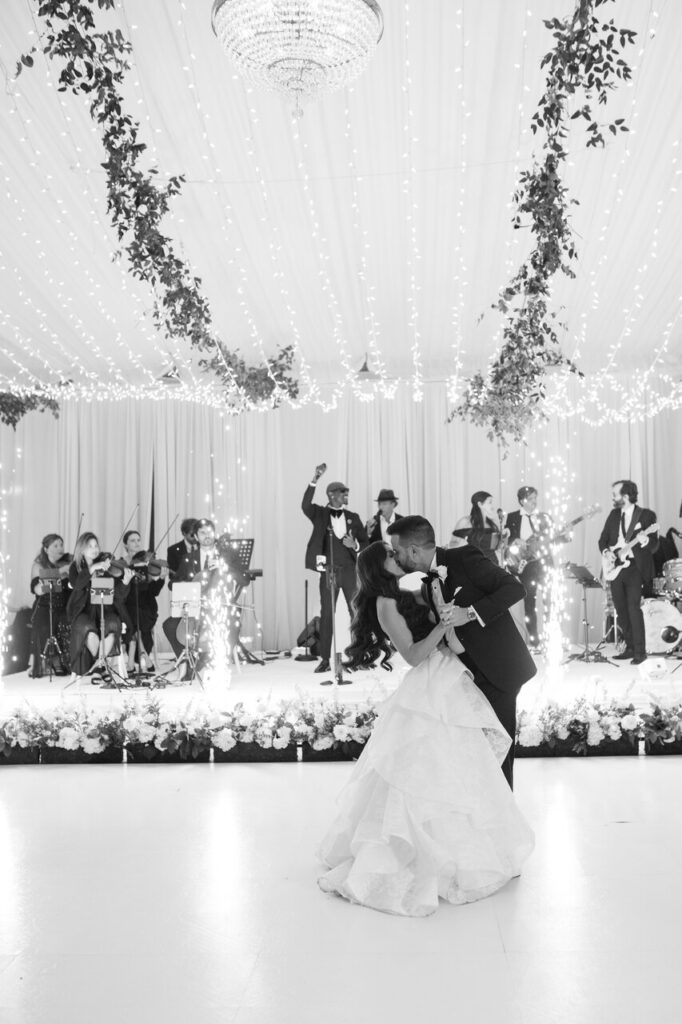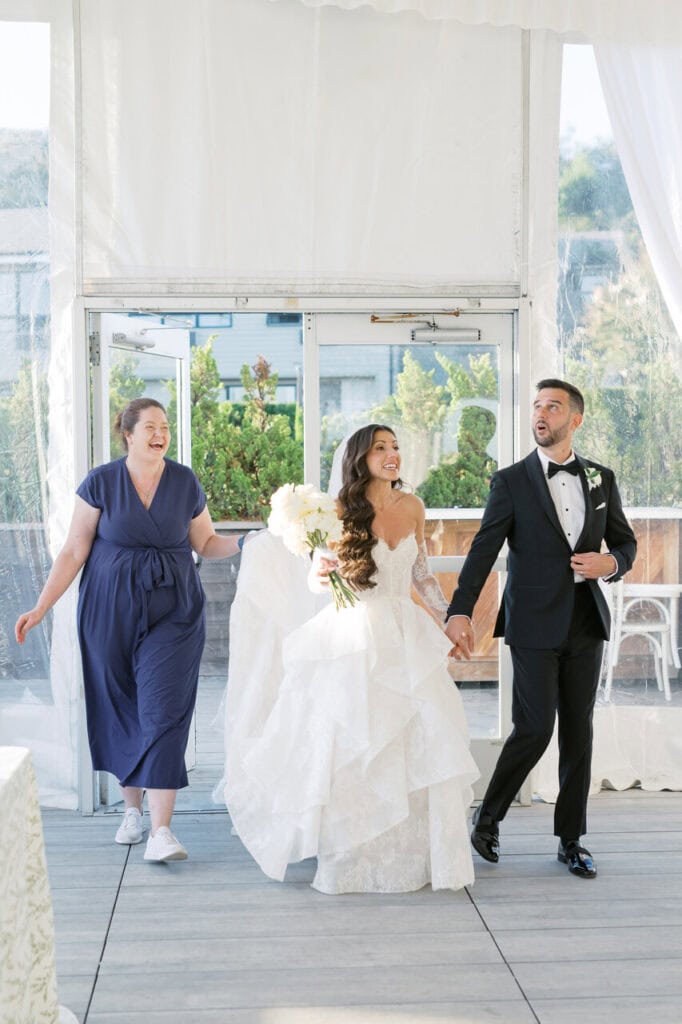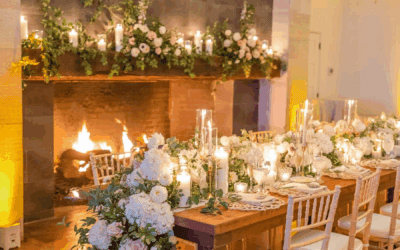If you’re engaged and starting to look at planners, it can feel like everyone kind of… seems the same.
Pretty Instagram.
Nice website.
Words like “day-of,” “month-of,” “full planning,” and “wedding management.”
So how do you know what you’re really getting?
This isn’t about dragging newer planners through the mud. Everyone starts somewhere, and some new planners come from backgrounds that give them the fundamentals they need.
This is about giving you a clear picture of the difference between hiring someone newer to the industry and hiring a planner with 10+ years of experience—and why that matters for your wedding day.
What Experience Actually Looks Like Behind the Scenes
For a full-planning wedding, my team and I will easily work 600+ hours on your event.
That time includes:
- Vendor research, outreach, and contract review
- Site visits, layout and floor plans, rain plans, and contingency plans
- Timeline creation for the entire weekend, not just the ceremony
- Communication with every single vendor, sometimes multiple times per week
- Design development, rentals, lighting, transportation, and guest flow
- Wedding-week logistics, rehearsal, production, and breakdown
Newer planners (often under five years in business) are usually still learning how much time a wedding actually takes. Many mean well, but they underprice and can’t realistically deliver the depth, presence, and support a complex wedding requires.
That doesn’t make them “bad planners.”
Their capacity and pricing often don’t align with the reality of a 600-hour event.
The Truth About “Day-Of” Planning: It Doesn’t Really Exist
Let’s tackle a big myth head-on:
There is no such thing as a planner who shows up on the wedding day and magically runs the event. I hate to burst your bubble, but Day of Coordination is not a real thing, and I am going to tell you why.
Even planners who advertise “day-of” or “month-of” are usually:
- Starting work 4–6 weeks before the wedding
- Reviewing contracts and timelines
- Confirming details with vendors
- Doing at least one walkthrough and one vendor meeting.
Why? Because it’s almost impossible to execute a wedding well if you don’t understand:
- The logistics of the venue
- The vendor team and their contracts
- The couple’s priorities, family dynamics, and non-negotiables
- The timing of catering, bar, band, transport, lighting, and more
When “day-of” can make sense
The only time actual day-of work really exists is when:
- The couple plans everything on their own
- They want someone to set out personal items (welcome table, photos, décor) in specific spots
- You come in for a short, defined window, set things up as instructed, and then leave
That’s not really planning. That’s event setup assistance.
For anything beyond that—running the flow of the Day, managing vendors, watching the timeline, solving problems—you’re not hiring someone “for a day.” You’re hiring someone for weeks of prep plus the Day itself.
Responsibility Doesn’t Leave When the Planner Does
Here’s a piece couples rarely hear:
If a planner:
- Has their name been attached to your wedding
- Helped recommend or coordinate vendors
- Is listed on the timeline as the “planner” or “coordinator”
…then they are part of the chain of responsibility for how the Day feels and functions.
This is where experience really shows. I’ve seen newer planners:
- Leave after the first dance or cake cutting
- Hand things off to “whoever’s still there” (venue, band, catering, and an “assistant” that’s never done a wedding)
- Assume the night will run itself from that point on
Meanwhile, if:
- The bar runs out of a key item
- Late-night food never appears
- Transportation is delayed
- The band or DJ goes off-script
- Personal items don’t get back to the couple
Guests and families don’t track who left when. They know, “We had a planner and the planner is responsible!
A seasoned planner understands that if my name is associated with your wedding, I am responsible for the experience—from setup to final send-off—and I staff and price accordingly. We are first on site and last off. That is what a veteran planner does.
Where Newer Planners Shine (And When They’re a Great Fit)
Newer planners aren’t the enemy. Many are:
- Talented
- Caring
- Hard-working
- Eager to serve their clients well
They can be a great fit when:
- The wedding is smaller or simpler
- The venue provides strong in-house support
- The couple is very hands-on and organized
- Everyone is clear about the scope: what the planner will and won’t take on
The issue isn’t “new vs. old.”
The issue is clarity and capacity.
Are they priced and structured to actually support the level of event you’re planning?
Do they have enough experience to anticipate issues—not just react to them?
What You Get With a Veteran Planner
After more than 15 years in weddings, here’s what I bring to the table
- Hundreds of weddings’ worth of experience: Which means, I’ve seen rain plans, wind plans, family drama, vendor emergencies, and travel delays—and I’ve created systems to handle them all.
- A team of vendors that have been fully vetted and worked with and are trusted partners. I don’t just send you a random list from Instagram. I recommend professionals I know who will show up, communicate, and care about your guests the way I do.
- First on-site and last off. I don’t disappear after the cake cutting. My team and I are there to oversee transitions, support vendors, and protect the guest experience until the key moments are genuinely complete.
- Realistic workload and pricing: I charge my worth because I know that a full-planning wedding is a 600+ hour project—and I want the capacity to show up fully for you. Think about this for a moment: you’re willing to pay a band $20k+ for spending 5 hours with you, but you want to pay a planner less for spending 600+ hours with you?
- Calm problem-solving when things go sideways: Experience doesn’t mean “nothing ever goes wrong.” It means we’re ready when it does.
How to Decide What You Need
When you’re choosing a planner, here are a few questions to ask (no matter who you’re talking to):
- When do you start working with us?
- Is it truly just “day-of”? (Red flag.)
- Or do they start support weeks or months in advance?
- How many hours do you realistically spend on a full-planning wedding?
- Anyone saying “a few meetings and the day itself” is underestimating.
- Will you or someone from your team be there, start to finish?
- Ask what time they arrive and when they leave.
- How many weddings do you take on per year?
- This tells you a lot about capacity and attention.
- How do you handle it when something big goes wrong?
- Listen for specifics, not vague “we’ll figure it out.”
This Is About Fit, Not Fear
Both newer and veteran planners have a place in this industry.
But if you’re investing in:
- A multi-day celebration
- A highly designed, logistically complex event
- A guest experience where you want everything to feel seamless and intentional
…then you don’t just need “someone there on the day.”
You need a planner who understands that there is no such thing as true day-of, who starts working well before your wedding week, and who has the experience to protect your vision, your investment, and your peace of mind from the very beginning.
That’s the level of care my team and I bring to every Jaclyn Watson Events wedding, and it’s why we love what we do!










